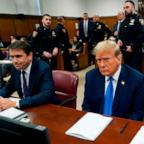Flipping Coins, Mortgage Defaults, and 'Sesame Street'
Romney and Obama, a coin toss, the mortgage mess and Big Bird.
Oct. 10, 2012 — -- Most people agree that climate change denialism, creationism, and other unfortunately-popular positions are inconsistent with modern science and have adverse policy consequences. This realization is less common when the matter at hand is mathematics, and the reason is sometimes that the connections between mathematical naivete and policy are not always as clear.
Consider, for example, an article on the BBC news website last week. It reported on a one-question test the Royal Statistical Society in the U.K. posed to about 100 members of parliament. The society asked the MPs what they thought the probability was that a coin, flipped twice, would land heads-up both times. The responses weren't impressive; fully 60 percent missed the correct answer of 1/4th or 25 percent. I suspect a similarly unimpressive result would come from 100 randomly chosen members of Congress.
Of course, the test is a bit silly and hardly definitive, but even this simple problem depends on a notion that can have significant policy consequences. First, a little background. Two events -- such as the two flips of a coin -- are said to be independent if the occurrence of one has no effect on the probability of the other's occurring. When that is the case, the probability they both occur is obtained by multiplying the probabilities of the two events. In this case, that is 1/2*1/2 or 1/4.
If three or more events are independent, then the probability that all three will occur is again obtained simply by multiplying their probabilities. Thus the probability of rolling three 6's in a row with a die is 1/6*1/6*1/6 or 1/216. Note how the probability of more such independent events occurring gets progressively smaller rather rapidly.
Among people who do know the multiplication rule for independent events, however, there is a different pitfall: they may treat all events as independent and always apply the rule. But if a number of events are not independent, the probability that all or most of them will occur doesn't necessarily shrink rapidly. Sometimes events are linked and the occurrence of one increases the probability that others will occur, so the probability of many such events occurring is much bigger than would be the case were the events independent.
This was the case with the mortgage crisis. Part of the reason it developed is that people assumed that defaults on mortgages, relatively rare events in normal times, were independent events, and, thus, that the probability of a large number of such defaults would be extremely tiny. By assuming independence of these defaults, they were assuming that the defaults would behave like coins or dice.
Nobody expects 80 or more heads in, say, 100 coin flips because the flips are independent and the product of their probabilities very small. But in bad times, mortgage defaults are not independent events and can have a cascading effect. The general economic situation provided a contagion of sorts. Certainly the so-called quants at financial firms understood this, but it's not so clear that their bosses did, nor, if the UK study is indicative of the situation in Congress here, that politicians charged with overseeing the industry did.




